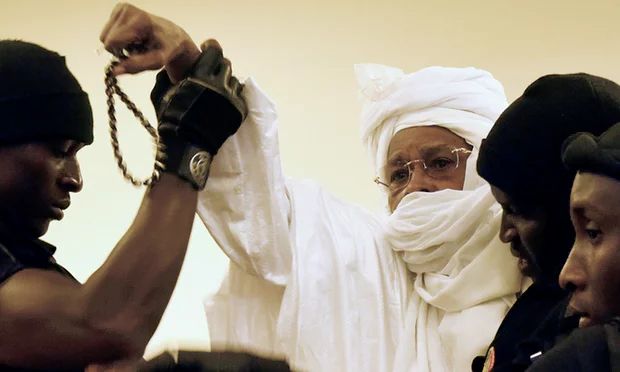“What I did not know was that the wolf was among the sheep”, with these words Mahamat-Saleh Haroun takes us on an emotional journey through his film documentary, Hissein Habré, A Chadian Tragedy. The film documentary is set in the backdrop of post Habré’s ten year rule of the Republic of Chad (1982-90). The protagonists are victims of his tyrannical rule being provided with a platform in their quest for justice after traumatizing experiences subjected onto them by Habré’s secret police, Documentation and Security Directorate (DDS). Haroun expounds on the deeply moving narratives of victims through visuals that highlight the contemporary journey of the physically and psychologically wounded Chadians, still fighting to reclaim their dignity once lost twenty five years ago.
The interviewer of the victims, Clement Abaïfouta, also the Chairperson of the Association of the Victims of the Crimes committed under Habré, uses direct and deeply personal questions to gently push victims to share their experiences with the world. One would say he is adding salt on their wounds but as some begin to shed tears, it is evident that Abaïfouta’s genuine interest in their plight is allowing them to reveal that their scars never healed. As a victim of the brutal regime himself, imprisoned for 4 years, Abaïfouta illustrates ubuntu (human kindness) as we see him tenderly washing the dainty body of an elderly man whom he referred to as “daddy.”
From the short film, Haroun conveys the impracticality of expecting victims’ healing to be through unity and reconciliation before justice is sought. He unfolds the victims and DDS as two sides of different coins that will take a long time to come together, perhaps when the omnipotent dictator Habré has been brought to justice. On one occasion Haroun brings Mahamat, a former DDS officer, together with a victim, but the officer defends his actions by citing the need for obedience to authority. “I was a subordinate. I was a soldier given orders” says Mahamat, as he washes himself of the responsibility of his actions. A trait which not only continues to broaden the gap between survivors and perpetrators, but also leaves the latter alienated by their former communities: they no longer have the protection of the cruel regime.
What we see in Hissein Habré, A Chadian Tragedy resonates across the continent – for those seeking justice after the fall of a dictatorial regime. The repercussions of a tyranny extends beyond the time period when the dictator is in power, affecting the next generation. We only get to see Habré once at the end of the film in a Senegalese court, the first ever to be established under the directive of the African Union (AU). To some this portrays an ounce of hope for transnational justice or African jurisdiction. The possibility to reevaluate the extent of immunities given to vicious tyrants by their peers in power. The strength of the people (victims). The potential of the AU to bring justice to not just only Chadians, but also Africans who have found themselves at the hands of other ruthless dictators.
By Hellen Abatoni, Politics and International Relations student at the University of Reading
After the screening we will be joined by Celeste Hicks, Kevin Jon Heller, Simon Massey and Kirsten Ainley for a discussion exploring the legacy of dictatorships and the future for transnational justice in Africa.
Buy tickets to see Hissene Habre: A Chadian Tragedy
Thur 3 Nov | 18:30 | Hackney Picturehouse BOOK NOW




















